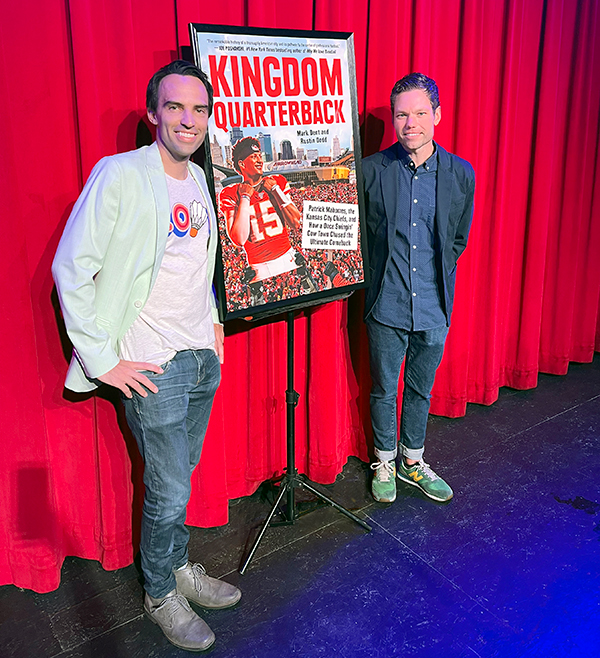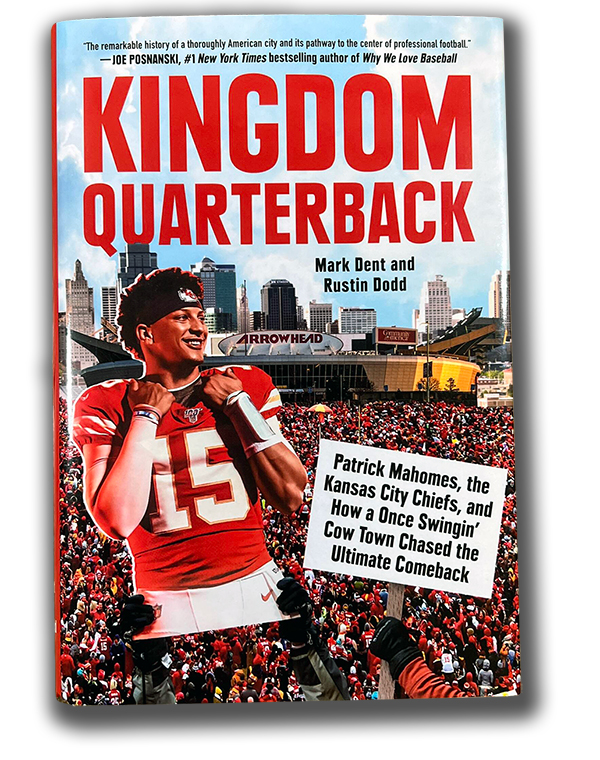
Patrick Mahomes is not just the hero of Kansas City; he is Kansas City. He doesn’t just provide thrilling athletic highlights to adoring fans in his adopted city—he reflects their values back to them. Mahomes rolled into town with his aw-shucks humbleness and fierce work ethic at exactly the moment when the city was poised to finally overcome a long, painful period of decline. He hitched a city’s hopes and dreams to his Superman cape and lifted off.
That’s the premise of Kingdom Quarterback by sports writers Rustin Dodd and Mark Dent. Dodd and Dent both grew up in Overland Park and graduated from the University of Kansas School of Journalism in 2009. The book weaves together two wild stories 100 years apart: The transformation of a muddy cowtown into a glittering and hedonistic metropolis fueled by jazz and booze which in turn gave way to idyllic but cruelly segregated suburban neighborhoods and the electrifying rebirth from ashes of the Kansas City Chiefs under Patrick Mahomes. They are familiar stories that Dodd and Dent flesh out with riveting and sometimes painful new detail
What was the original idea for the book, and did it change?
DENT: The original idea came in 2020 after the Chiefs won the Super Bowl. Russ and I started talking and I kind of had the germ of an idea: Alright, Kansas City is kind of on the rise. The Chiefs have just won the Super Bowl, and they are probably going to win more because they have Patrick Mahomes, who seems to be the greatest player in the league now and maybe of this generation.
At the same time, Kansas City had been changing a lot over the last 15 years. It had been growing in population for the first time in forever. Downtown had kind of been revived along with a lot of other neighborhoods. So there’s all these things happening at the same time. What if we use this as an idea to tell the story of the Chiefs and Mahomes as well as the city that had always kind of been down on its luck, similar to the Chiefs prior to when Mahomes got there.
We did change the idea a little bit. Some of the history that we included; we went further in depth in ways we didn’t expect. And certainly in 2020 we were very aware that not only was Kansas City changing in the sense that it was growing, but people were also reflecting on the past—and the present, frankly—which you saw in the summer of 2020 when we had protests over the murder of George Floyd and people were really turning an eye toward local policing and the legacy of J.C. Nichols.
I think as we were working on the book, we realized the story of Kansas City today needs to be told, not just as, “We have more nice things downtown.” We also have this kind of fight going on that is extremely important to make sure Kansas City is more equitable.

The book has two major characters, Jesse Clyde Nichols and Patrick Mahomes. Why did you choose to intertwine the stories of these two men born more than a century apart?
DODD: We see Patrick Mahomes as symbolic of modern Kansas City. He’s certainly the most famous person in Kansas City and maybe one of the most famous people who’s ever lived here. And yet as we were telling the story of the city’s history, I’m not sure that there’s anybody more influential in Kansas City’s history for good or bad than J.C. Nichols.
Mark and I grew up here in the ’90s, and we sort of knew of J. C. Nichols in broad strokes. Anybody that’s been in Kansas City for the last 20 years has encountered his story. But it was always like you would read a few paragraphs. Part of the mission for us was understanding him in full. As a journalist, sometimes you’re most interested in something just so you personally can understand it.
Kingdom Quarterback is deeply reported. What were some of the favorite unexpected things you learned when researching it?
DENT: I would say all the stuff about how Kansas City and the two states was confusing even back in the 1870s and 1880s. There’s a detail in there about how a mayor at the time, Van Horn, whose name is still all over the city, got everything set up with both state legislatures so that Kansas City would become (entirely) part of Kansas. But then it failed just because the emissary who went to Washington, D.C. ended up falling in love with a woman and just moved to Europe instead of lobbying Congress for final approval.
Another thing that was fascinating but shows the grim aspects of our history, was learning just how influential J.C. Nichols was not just in Kansas City but nationally and finding that his racially restrictive covenants and his methods to keep them going on forever, were emulated all over the place. And, frankly, they were kind of taken up by the Federal Housing Administration in 1934, which was the beginning of redlining. Learning all that was very eye-opening.
You write that you interviewed around 100 people for your book, including many black Kansas Citians, about the segregation created by Nichols’ covenants and the east-west racial dividing line that still exists, although it is more porous now. After all those conversations, what is your take on how we are doing as a city today in terms of racial equality?
DENT: A lot of people I spoke with think that on Troost Avenue, which historically has been the dividing line, there have been good improvements on parts of it. Local businesses have sprung up, particularly in the Midtown area. They’ve come with a lot of good amenities. One person I talked to, an activist in the community, lives around 30th and Troost in a new apartment and loves it there. She grew up on the East Side and remembers when she didn’t even want to go walking there at night, and now everybody can walk there at night with their dogs and it’s a very good thing.
But at the same time, if you just go a few blocks farther east, those economic benefits have not extended into that part of the community. That’s kind of what you see, big picture, in Kansas City is that there’s still concentrated poverty on the East Side and there are some neighborhoods that have been revived but a lot of people within those neighborhoods are facing challenges of higher rent and higher tax bills. And even on the East Side where there’s still concentrated poverty, the rent is still going up because there’s a lot of speculation there and property values are going up in the city there.
So there are a whole host of problems and KC Tenants and a lot of other housing activists have a presence that I think was missing for the last couple of decades, which is when the beginnings of the “new Kansas City” kind of started in the early 2000s. There wasn’t much of a check on the development to make sure that the benefits are extending to all the neighborhoods, and in the neighborhoods that are reviving that there’s enough affordable housing. And now there are people pushing for that. There’s been a lot of gains in the last three or four years but not nearly enough yet.
When you look at all the great quarterbacks around now—Josh Allen, Joe Burrow, Jalen Hurts, etc.—why do you think Patrick Mahomes is such a perfect fit for Kansas City?
DODD: He grew up in East Texas, which is a very specific part of Texas and different than Dallas and Houston. It’s smaller, more out of the way. When he was going through the draft process in 2017, his agents even looked at Kansas City as a place that would fit his personality.
How so?
DODD: Texas is not the Midwest, but Patrick almost feels Midwestern in the way he goes about himself. That said, I think he could probably fit in anywhere, because one of his greatest gifts outside of his athletic prowess is his ability to connect with people and to be relatable to everybody.
‘‘In a lot of places, you find people who might be big fans of the sports team, or maybe they just love their city because they grew up there, but in Kansas City they come together in a way that they feed off each other.” –Mark Dent
The book talks about the Kansas City Spirit with a capital “S.” Every city has some level of civic pride and cities with pro sports teams generally are proud of them. What makes Kansas City different?
DENT: I would go out on a limb and say that a lot of cities don’t have a lot of civic pride. I live in Texas. I’ve lived in three cities down here and there really isn’t very much civic pride. There’s state pride. I think Kansas City’s [civic pride] is different from other places because of the way that the sports and the civic pride are woven together. In a lot of places, you find people who might be big fans of the sports team, or maybe they just love their city because they grew up there, but in Kansas City they come together in a way that they feed off each other.
The fact that Kansas City has had good sporting success lately has unlocked the pride that was always there. Like in the ’90s, when [Rustin and I] were growing up and it was tougher times for the city and the sports teams, we were just waiting for someone to recognize Kansas City, and we would get so excited if Kansas City appeared anywhere nationally. And now that Kansas City has a little bit more cred nationally it’s just developed into something even bigger. That’s why you see everybody wearing shirts that just say “Kansas City,” not even Chiefs shirts.
DODD: The other thing I would add is that I think Kansas City is the perfect size, in that it’s a major league city with professional sports teams, and those sports teams are often the day-to-day language that connects people. In a place like Kansas City, even if you’re not a sports fan, you sort of understand the language. It’s sort of inescapable. The Chiefs and Royals are part of our daily lives in a way that even if you’re not a hard-core fan of the teams, you are aware of the players and the characters and the coaches.
In a bigger city I think you’re able to escape that if you’re not a sports person. Like in New York or L.A., it’s easy to go about your day and not think about all the many sports teams that exist in those cities. Whereas in a place like Kansas City, everybody thinks about the Chiefs and Royals a lot, even if you don’t have a huge emotional investment in them.
What is the lowdown on how living in Dallas, Mark, and Brooklyn, Rustin, is different than living in Kansas City?
DENT: I think first and foremost—I hope not too many Dallas people end up reading this—but there is that lack of civic pride. In Kansas City—I try to explain this to people down here—you can just kind of feel it, people caring so much about the place and these sporting teams. And you see physical manifestations of that. Everybody has a Chiefs flag on the block, and there’s five or six big companies that sell Kansas City apparel now. You don’t really have that down here. I also can speak to what Rustin was saying about size. [Dallas] is so spread out. Kansas City sprawls, too, but you still get the feeling like everyone is on the same page, thinking about a lot of the same things. People’s interests down here are so much more divided.
‘‘I think there’s something true about the way that the Kansas City essence stays with you even when you are in other places. I find other people in big cities who are from Kansas City gravitate towards each other.” –Rustin Dodd
DODD: I don’t know if this perfectly answers your question, but I interviewed Calvin Trillin, the Kansas City native and New York writer, for the book, and I asked him whether he held onto Kansas City when he lived in New York for decades, and he had a story that he always said that even though he lived in the West Village neighborhood, he felt like he raised his daughters in Kansas City—that they were honorary Kansas Citians because their 800-square-foot apartment was Kansas City, it was not New York.
I think there’s something true about the way that the Kansas City essence stays with you even when you are in other places. I find other people in big cities who are from Kansas City gravitate towards each other. Maybe that’s true of people from Cleveland or Milwaukee or St. Louis, but I’m not sure if it is true.
When I would watch a Chiefs game in New York City and there would be dozens of other Kansas Citians around, people from other parts of the country would look at the group and be like, “Why are you guys all together watching this football team? People from where I’m from, we don’t really do this.”
I won’t ask you to make predictions about how the Chiefs will do this year, but if the 2023-2024 season were to be the next chapter in your book, what themes would you expect to see play out?
DENT: That’s a tough question. Predictions are always hard. I think what we would see is something relatively similar to last year in that we have more doubts around the Chiefs than one would expect. Don’t get me wrong, [laughs] they’re still the Vegas favorite for the Super Bowl. But people are like, “Well, now Chris Jones, the defensive lineman, is going to be coming in late to the season, if at all. He might continue to hold out. People are worried about that. People are talking about, “It’s all new wide receivers. How are they going to acclimate?”
I don’t know what it is but there’s always just a little bit of doubt around Mahomes and the Chiefs over these last three or four years. And then the players, of course, act like it’s a mountain of doubt, and get even more motivated, and it leads to them getting to the AFC championship game. I think that is what the storyline would be. It would look a little like what we have now and potentially we would have truly a repeat of a storyline. I think it will be Eagles-Chiefs again in the Super Bowl.
DODD: So I slightly disagree with Mark. I think Patrick Mahomes after he won the last Super Bowl, he kind of stood on the podium and he said he didn’t want to declare the Chiefs a dynasty yet. I think that’s one of the main themes going forward, is how does Kansas City react to the idea that it’s home to this dynasty football team. And will the dynasty continue? And what would that mean for Kansas City moving forward?
How does this city that always has sort of had this creeping doubt about its own identity, how does it handle being on top of the mountain? How will Kansas City handle having likely the best quarterback for the next decade and winning a few more championships?
Interview condensed and minimally edited for clarity.


